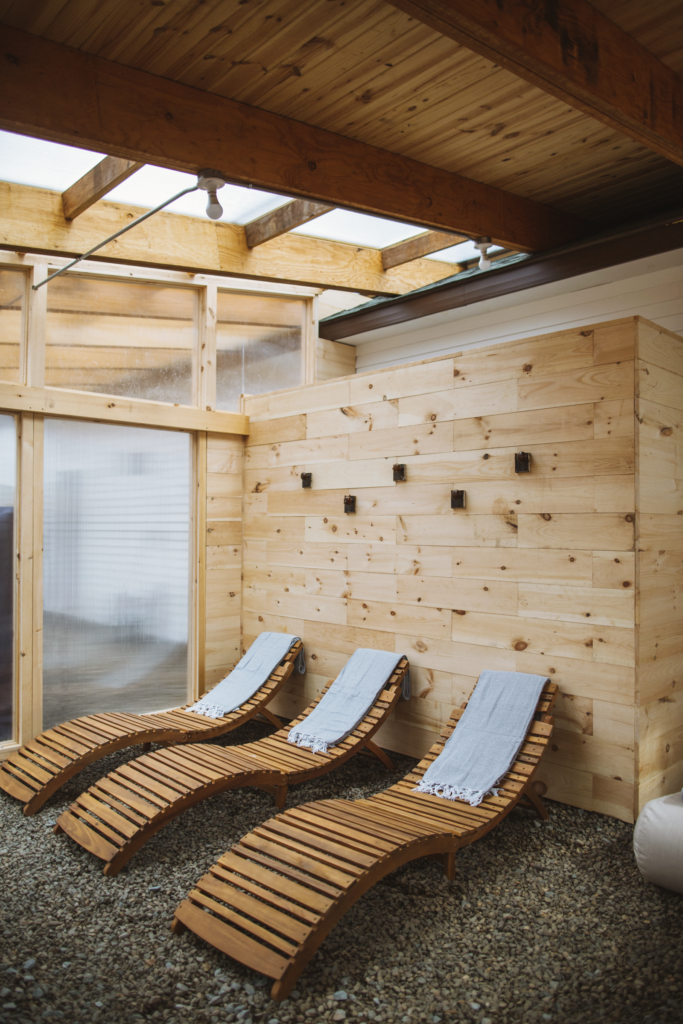From afar, my wife, Dana, and I must have looked like hotel guests in a huff. We were striding across the grass, arms pumping, as though off to report some customer-service outrage to the manager. In fact, we were on a pre-breakfast fitness walk—step one of our wellness regimen at Kenoza Hall, a new boutique resort in New York’s southwestern Catskills. Noon found us hanging upside down from nylon hammocks, part of a private aerial-yoga session, after which we alternated between soaking in the outdoor hot tub and dumping bucketfuls of cold water on our head. As we enjoyed chilled martinis and peppery Gruyère popovers on the patio that evening, we felt a state of bodily equilibrium we haven’t experienced in months.
Kenoza Hall is one of dozens of recent openings making this formerly unglamorous section of upstate New York more appealing for travelers this fall. Because western Sullivan County, which stretches from the foothills of the Catskill mountain range to the Pennsylvania border, is more remote and rural than the more famous enclaves near the Hudson River, it has stayed relatively under the radar—though the original Woodstock Festival actually took place here, in the hamlet of Bethel, not the town of Woodstock, as many assume. In recent years the area has drawn a younger, more bohemian merchant class, with the affordable land encouraging hospitality entrepreneurs to acquire the sort of acreage that allows guests to hike, fish, spread out a picnic, and socially distance without effort.
The sauna, part of an extensive wellness facility at Kenoza Hall
Peter Crosby
Kenoza Lake, which is great for canoeing
Peter Crosby
An expensively renovated neo-Victorian boardinghouse, Kenoza Hall would be a desirable getaway in normal times, but six months into a pandemic that has caused people to value outdoor space and mental health like never before, it is—like much of the upstate region—exactly the kind of escape we all need. Even when its 22 rooms are full, Kenoza’s spread of woods, lake, lawn, and ample meadow average out to more than an acre per guest. The restaurant’s Dover sole meunière and other Continental classics are a surprisingly cosmopolitan style of cooking to find in the country. Its wellness offerings, the main attraction, are mostly alfresco—the opposite of the high-intensity, high-tech fitness trends prevalent in cities, which have become, for me anyway, even less appealing than they were pre-pandemic.
This area’s revival kicked off a generation ago, in Narrowsburg, a village on the Delaware River. To the east in Livingston Manor, new vintage shops and Airbnbs have come online in the past year, and north along the Delaware in Callicoon a new cidery and orchard called Seminary Hill will welcome visitors by harvest season. Perched just above Main Street, it has stunning views of a bell tower and the river: James Fenimore Cooper’s America with a dash of Tuscany.
Seminary Hill is renting out rooms in a pair of historic houses in Callicoon that have been stylishly redone by Homestedt, a hospitality and home-design outfit with an American-vintage-meets-Nordic-minimalist aesthetic. The company’s owners, Tom Roberts and Anna Aberg, do business out of a pocket-size home-goods store in Livingston Manor. Like most creative entrepreneurs hereabouts, they operate in the shadow of Foster Supply Hospitality. Run by Sims Foster, a native of the area, and his wife, Kirsten Harlow Foster, the company has opened five hotels and two restaurants over the past decade, doing more than any private outfit to put this part of the Catskills back on the travel map. Until Kenoza, the jewel in its crown was the three-year-old DeBruce, a renovated boardinghouse with a trout stream and an actual mountain in its backyard.
After another brisk morning walk at Kenoza, Dana and I checked out, drove over to DeBruce, and hiked its shady, fern-edged switchback trails. We took our boxed lunch on the porch: chilled ginger-carrot soup, locally sourced charcuterie and cheese, and Hudson Valley foie gras. But the most rewarding place of all for a hike might be a beer garden, Upward Brewing Company, in Livingston Manor, another recent opening whose excess of outdoor space now feels radically forward-looking. It would probably be more accurate to call it a dog-friendly beer garden, one with a frog pond for kids and a scattering of picnic tables and shade trees. The hiking option is a wooded private hill the brewery’s proprietors have dubbed Beer Mountain. If we hadn’t done two walks already, we might have climbed it. But sitting at the table, breathing in the fresh air between sips of our Upward Pilsner, was all we needed.
Doubles from $450, including activities; kenozahall.com
This article appeared in the October 2020 issue of Condé Nast Traveler. Subscribe to the magazine here.





